University Assignment: BUS 7055 - Brexit's Impact on Construction
VerifiedAdded on 2022/09/08
|8
|1800
|22
Essay
AI Summary
This essay examines the multifaceted impact of Brexit on the UK construction industry. It delves into the potential labor shortages resulting from restrictions on free movement, as a significant portion of the workforce is from the EU. The essay also highlights the expected housing crisis due to decreased investment and population changes. Furthermore, it analyzes the anticipated increase in material costs due to trade barriers and the reduction in available funding from the EU. The essay concludes that the construction industry faces significant challenges, requiring strategic adaptation to mitigate the negative consequences of Brexit. This essay provides a comprehensive overview of the economic and social implications, supported by relevant research and analysis of the construction industry in the UK.
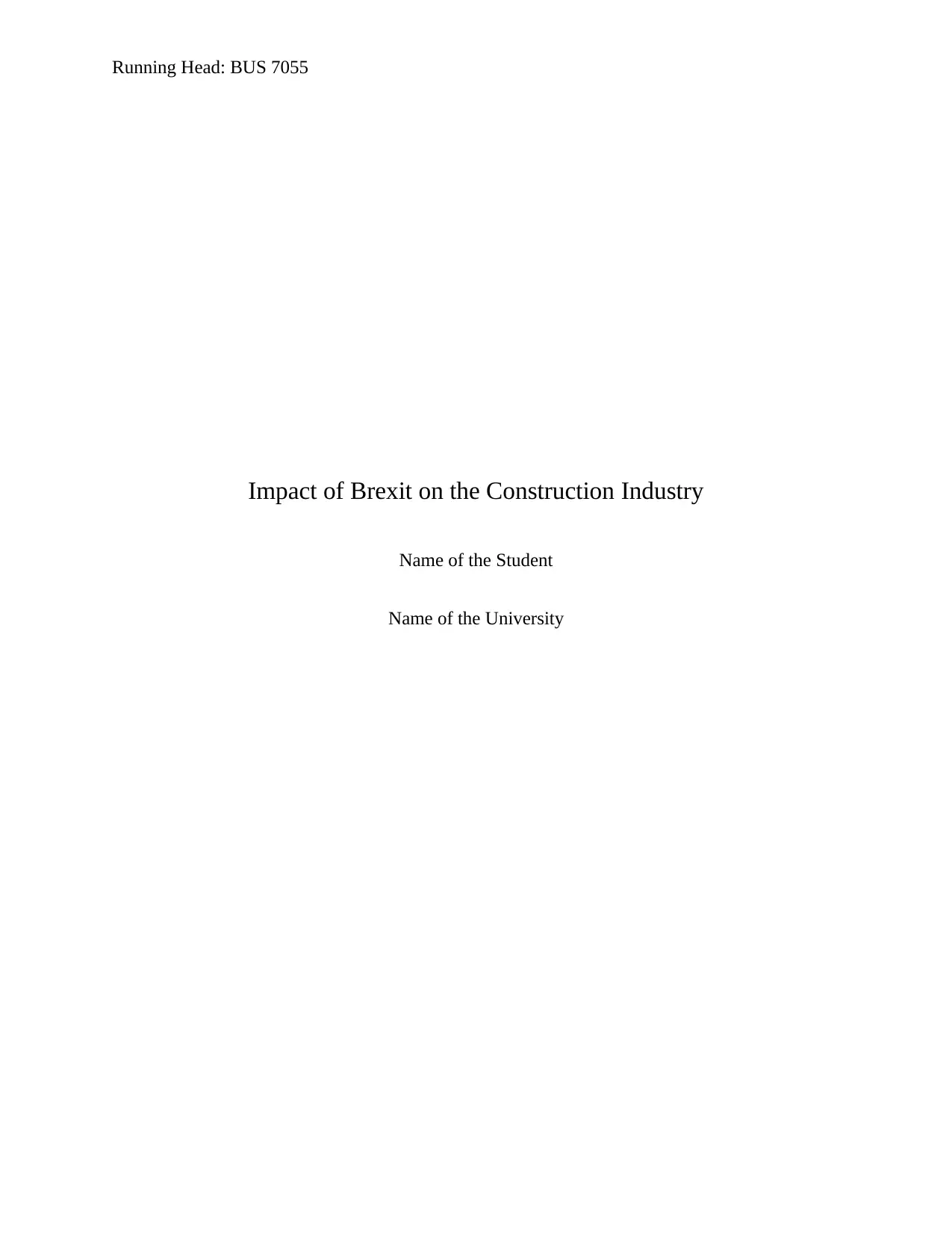
Running Head: BUS 7055
Impact of Brexit on the Construction Industry
Name of the Student
Name of the University
Impact of Brexit on the Construction Industry
Name of the Student
Name of the University
Paraphrase This Document
Need a fresh take? Get an instant paraphrase of this document with our AI Paraphraser
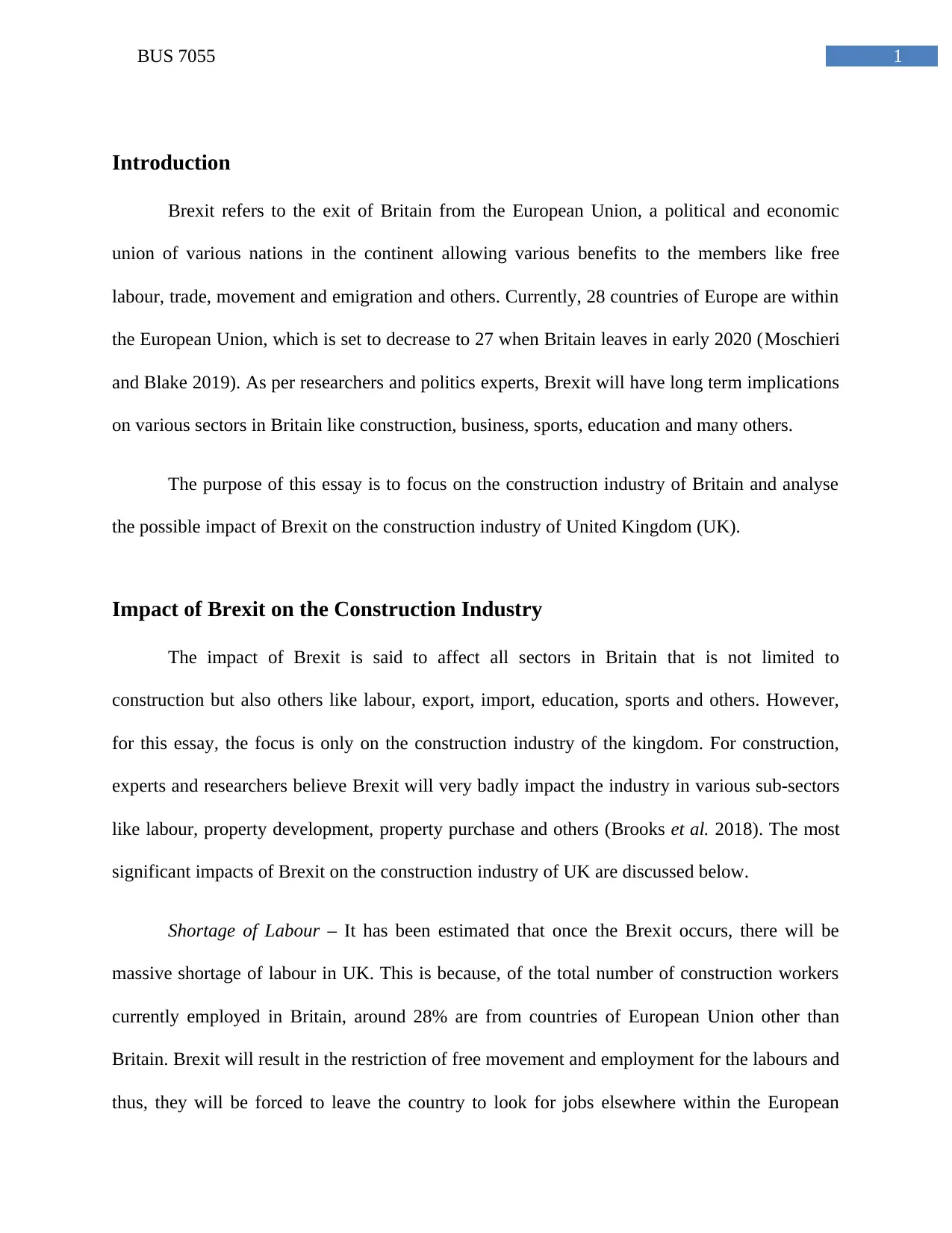
1BUS 7055
Introduction
Brexit refers to the exit of Britain from the European Union, a political and economic
union of various nations in the continent allowing various benefits to the members like free
labour, trade, movement and emigration and others. Currently, 28 countries of Europe are within
the European Union, which is set to decrease to 27 when Britain leaves in early 2020 (Moschieri
and Blake 2019). As per researchers and politics experts, Brexit will have long term implications
on various sectors in Britain like construction, business, sports, education and many others.
The purpose of this essay is to focus on the construction industry of Britain and analyse
the possible impact of Brexit on the construction industry of United Kingdom (UK).
Impact of Brexit on the Construction Industry
The impact of Brexit is said to affect all sectors in Britain that is not limited to
construction but also others like labour, export, import, education, sports and others. However,
for this essay, the focus is only on the construction industry of the kingdom. For construction,
experts and researchers believe Brexit will very badly impact the industry in various sub-sectors
like labour, property development, property purchase and others (Brooks et al. 2018). The most
significant impacts of Brexit on the construction industry of UK are discussed below.
Shortage of Labour – It has been estimated that once the Brexit occurs, there will be
massive shortage of labour in UK. This is because, of the total number of construction workers
currently employed in Britain, around 28% are from countries of European Union other than
Britain. Brexit will result in the restriction of free movement and employment for the labours and
thus, they will be forced to leave the country to look for jobs elsewhere within the European
Introduction
Brexit refers to the exit of Britain from the European Union, a political and economic
union of various nations in the continent allowing various benefits to the members like free
labour, trade, movement and emigration and others. Currently, 28 countries of Europe are within
the European Union, which is set to decrease to 27 when Britain leaves in early 2020 (Moschieri
and Blake 2019). As per researchers and politics experts, Brexit will have long term implications
on various sectors in Britain like construction, business, sports, education and many others.
The purpose of this essay is to focus on the construction industry of Britain and analyse
the possible impact of Brexit on the construction industry of United Kingdom (UK).
Impact of Brexit on the Construction Industry
The impact of Brexit is said to affect all sectors in Britain that is not limited to
construction but also others like labour, export, import, education, sports and others. However,
for this essay, the focus is only on the construction industry of the kingdom. For construction,
experts and researchers believe Brexit will very badly impact the industry in various sub-sectors
like labour, property development, property purchase and others (Brooks et al. 2018). The most
significant impacts of Brexit on the construction industry of UK are discussed below.
Shortage of Labour – It has been estimated that once the Brexit occurs, there will be
massive shortage of labour in UK. This is because, of the total number of construction workers
currently employed in Britain, around 28% are from countries of European Union other than
Britain. Brexit will result in the restriction of free movement and employment for the labours and
thus, they will be forced to leave the country to look for jobs elsewhere within the European
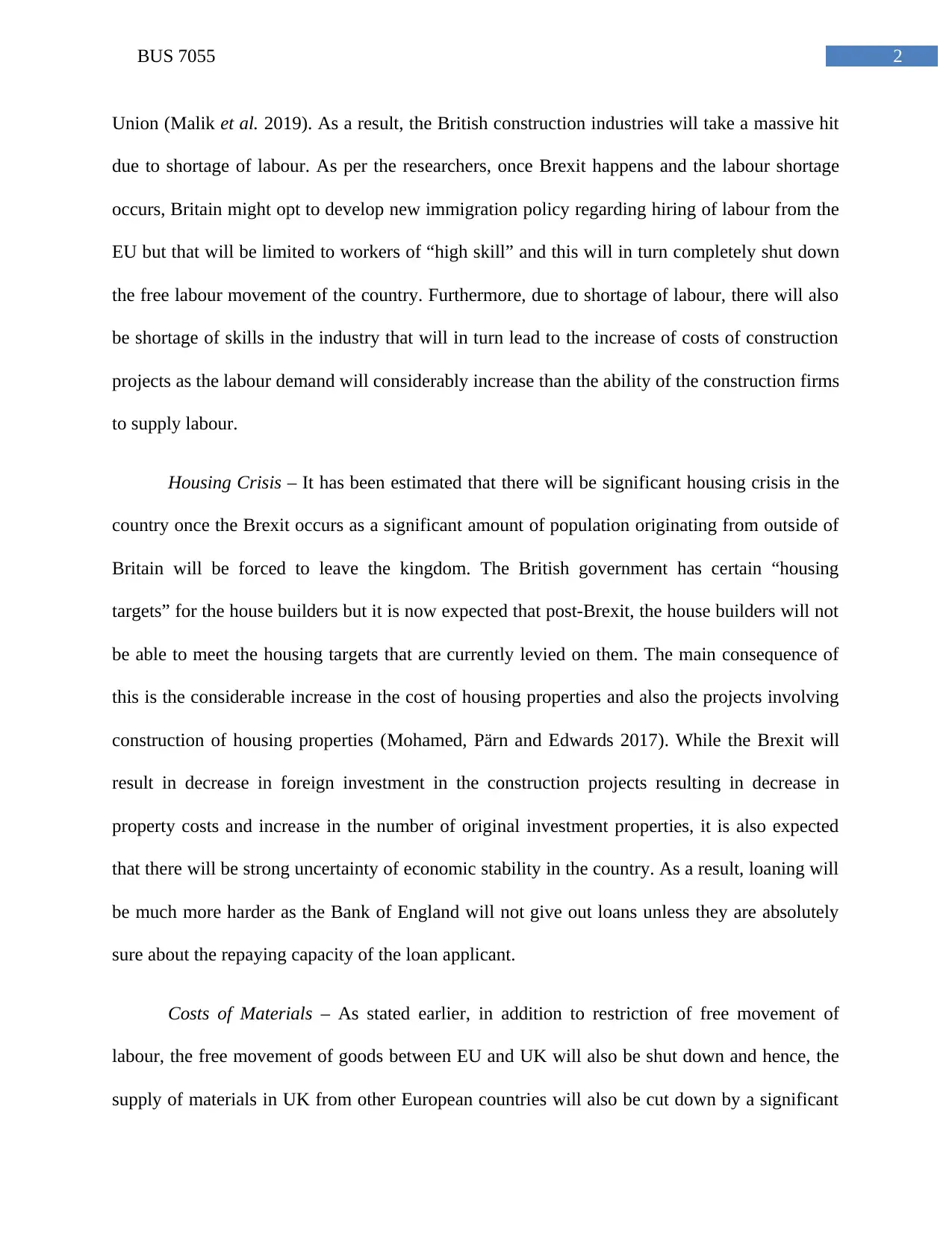
2BUS 7055
Union (Malik et al. 2019). As a result, the British construction industries will take a massive hit
due to shortage of labour. As per the researchers, once Brexit happens and the labour shortage
occurs, Britain might opt to develop new immigration policy regarding hiring of labour from the
EU but that will be limited to workers of “high skill” and this will in turn completely shut down
the free labour movement of the country. Furthermore, due to shortage of labour, there will also
be shortage of skills in the industry that will in turn lead to the increase of costs of construction
projects as the labour demand will considerably increase than the ability of the construction firms
to supply labour.
Housing Crisis – It has been estimated that there will be significant housing crisis in the
country once the Brexit occurs as a significant amount of population originating from outside of
Britain will be forced to leave the kingdom. The British government has certain “housing
targets” for the house builders but it is now expected that post-Brexit, the house builders will not
be able to meet the housing targets that are currently levied on them. The main consequence of
this is the considerable increase in the cost of housing properties and also the projects involving
construction of housing properties (Mohamed, Pärn and Edwards 2017). While the Brexit will
result in decrease in foreign investment in the construction projects resulting in decrease in
property costs and increase in the number of original investment properties, it is also expected
that there will be strong uncertainty of economic stability in the country. As a result, loaning will
be much more harder as the Bank of England will not give out loans unless they are absolutely
sure about the repaying capacity of the loan applicant.
Costs of Materials – As stated earlier, in addition to restriction of free movement of
labour, the free movement of goods between EU and UK will also be shut down and hence, the
supply of materials in UK from other European countries will also be cut down by a significant
Union (Malik et al. 2019). As a result, the British construction industries will take a massive hit
due to shortage of labour. As per the researchers, once Brexit happens and the labour shortage
occurs, Britain might opt to develop new immigration policy regarding hiring of labour from the
EU but that will be limited to workers of “high skill” and this will in turn completely shut down
the free labour movement of the country. Furthermore, due to shortage of labour, there will also
be shortage of skills in the industry that will in turn lead to the increase of costs of construction
projects as the labour demand will considerably increase than the ability of the construction firms
to supply labour.
Housing Crisis – It has been estimated that there will be significant housing crisis in the
country once the Brexit occurs as a significant amount of population originating from outside of
Britain will be forced to leave the kingdom. The British government has certain “housing
targets” for the house builders but it is now expected that post-Brexit, the house builders will not
be able to meet the housing targets that are currently levied on them. The main consequence of
this is the considerable increase in the cost of housing properties and also the projects involving
construction of housing properties (Mohamed, Pärn and Edwards 2017). While the Brexit will
result in decrease in foreign investment in the construction projects resulting in decrease in
property costs and increase in the number of original investment properties, it is also expected
that there will be strong uncertainty of economic stability in the country. As a result, loaning will
be much more harder as the Bank of England will not give out loans unless they are absolutely
sure about the repaying capacity of the loan applicant.
Costs of Materials – As stated earlier, in addition to restriction of free movement of
labour, the free movement of goods between EU and UK will also be shut down and hence, the
supply of materials in UK from other European countries will also be cut down by a significant
⊘ This is a preview!⊘
Do you want full access?
Subscribe today to unlock all pages.

Trusted by 1+ million students worldwide
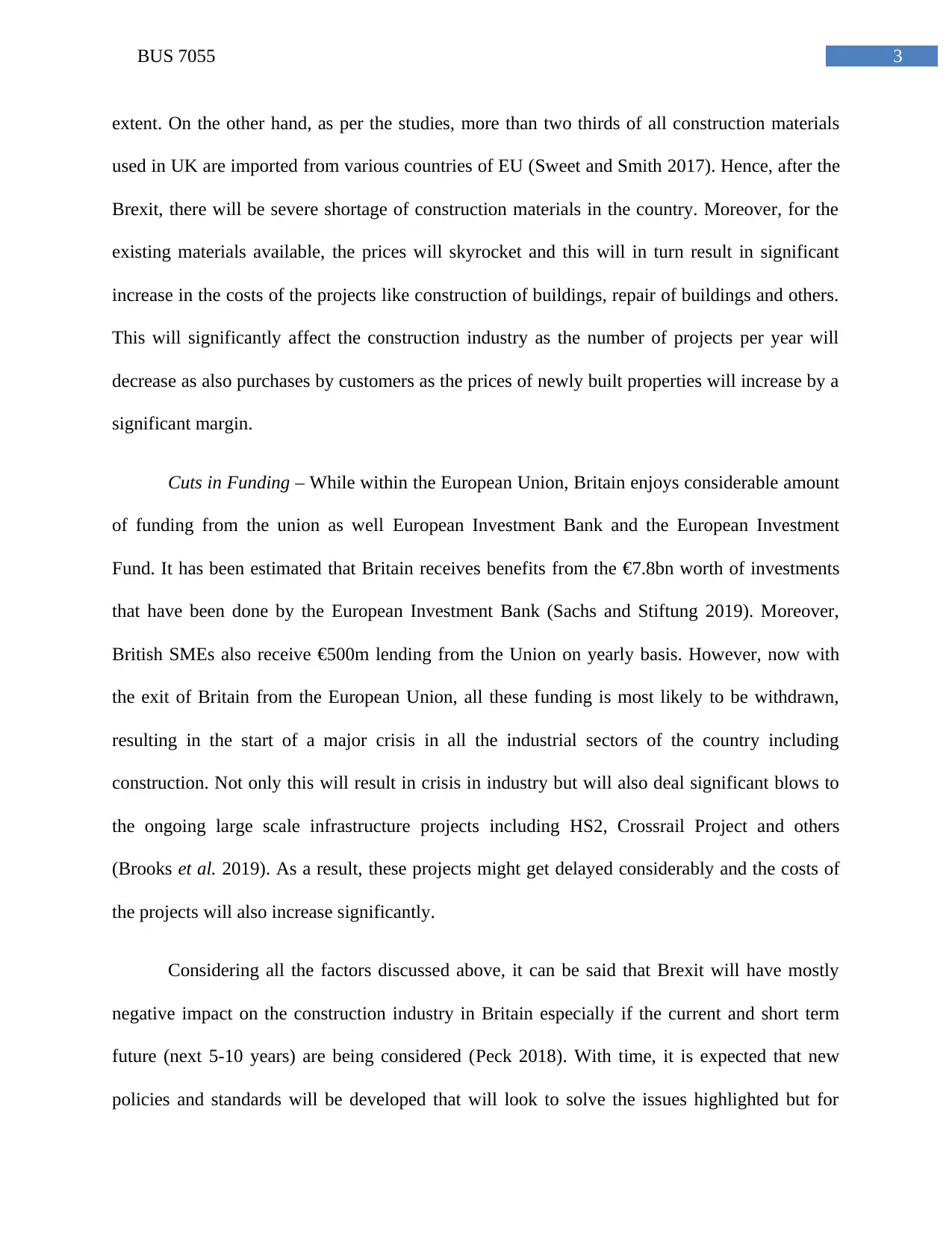
3BUS 7055
extent. On the other hand, as per the studies, more than two thirds of all construction materials
used in UK are imported from various countries of EU (Sweet and Smith 2017). Hence, after the
Brexit, there will be severe shortage of construction materials in the country. Moreover, for the
existing materials available, the prices will skyrocket and this will in turn result in significant
increase in the costs of the projects like construction of buildings, repair of buildings and others.
This will significantly affect the construction industry as the number of projects per year will
decrease as also purchases by customers as the prices of newly built properties will increase by a
significant margin.
Cuts in Funding – While within the European Union, Britain enjoys considerable amount
of funding from the union as well European Investment Bank and the European Investment
Fund. It has been estimated that Britain receives benefits from the €7.8bn worth of investments
that have been done by the European Investment Bank (Sachs and Stiftung 2019). Moreover,
British SMEs also receive €500m lending from the Union on yearly basis. However, now with
the exit of Britain from the European Union, all these funding is most likely to be withdrawn,
resulting in the start of a major crisis in all the industrial sectors of the country including
construction. Not only this will result in crisis in industry but will also deal significant blows to
the ongoing large scale infrastructure projects including HS2, Crossrail Project and others
(Brooks et al. 2019). As a result, these projects might get delayed considerably and the costs of
the projects will also increase significantly.
Considering all the factors discussed above, it can be said that Brexit will have mostly
negative impact on the construction industry in Britain especially if the current and short term
future (next 5-10 years) are being considered (Peck 2018). With time, it is expected that new
policies and standards will be developed that will look to solve the issues highlighted but for
extent. On the other hand, as per the studies, more than two thirds of all construction materials
used in UK are imported from various countries of EU (Sweet and Smith 2017). Hence, after the
Brexit, there will be severe shortage of construction materials in the country. Moreover, for the
existing materials available, the prices will skyrocket and this will in turn result in significant
increase in the costs of the projects like construction of buildings, repair of buildings and others.
This will significantly affect the construction industry as the number of projects per year will
decrease as also purchases by customers as the prices of newly built properties will increase by a
significant margin.
Cuts in Funding – While within the European Union, Britain enjoys considerable amount
of funding from the union as well European Investment Bank and the European Investment
Fund. It has been estimated that Britain receives benefits from the €7.8bn worth of investments
that have been done by the European Investment Bank (Sachs and Stiftung 2019). Moreover,
British SMEs also receive €500m lending from the Union on yearly basis. However, now with
the exit of Britain from the European Union, all these funding is most likely to be withdrawn,
resulting in the start of a major crisis in all the industrial sectors of the country including
construction. Not only this will result in crisis in industry but will also deal significant blows to
the ongoing large scale infrastructure projects including HS2, Crossrail Project and others
(Brooks et al. 2019). As a result, these projects might get delayed considerably and the costs of
the projects will also increase significantly.
Considering all the factors discussed above, it can be said that Brexit will have mostly
negative impact on the construction industry in Britain especially if the current and short term
future (next 5-10 years) are being considered (Peck 2018). With time, it is expected that new
policies and standards will be developed that will look to solve the issues highlighted but for
Paraphrase This Document
Need a fresh take? Get an instant paraphrase of this document with our AI Paraphraser
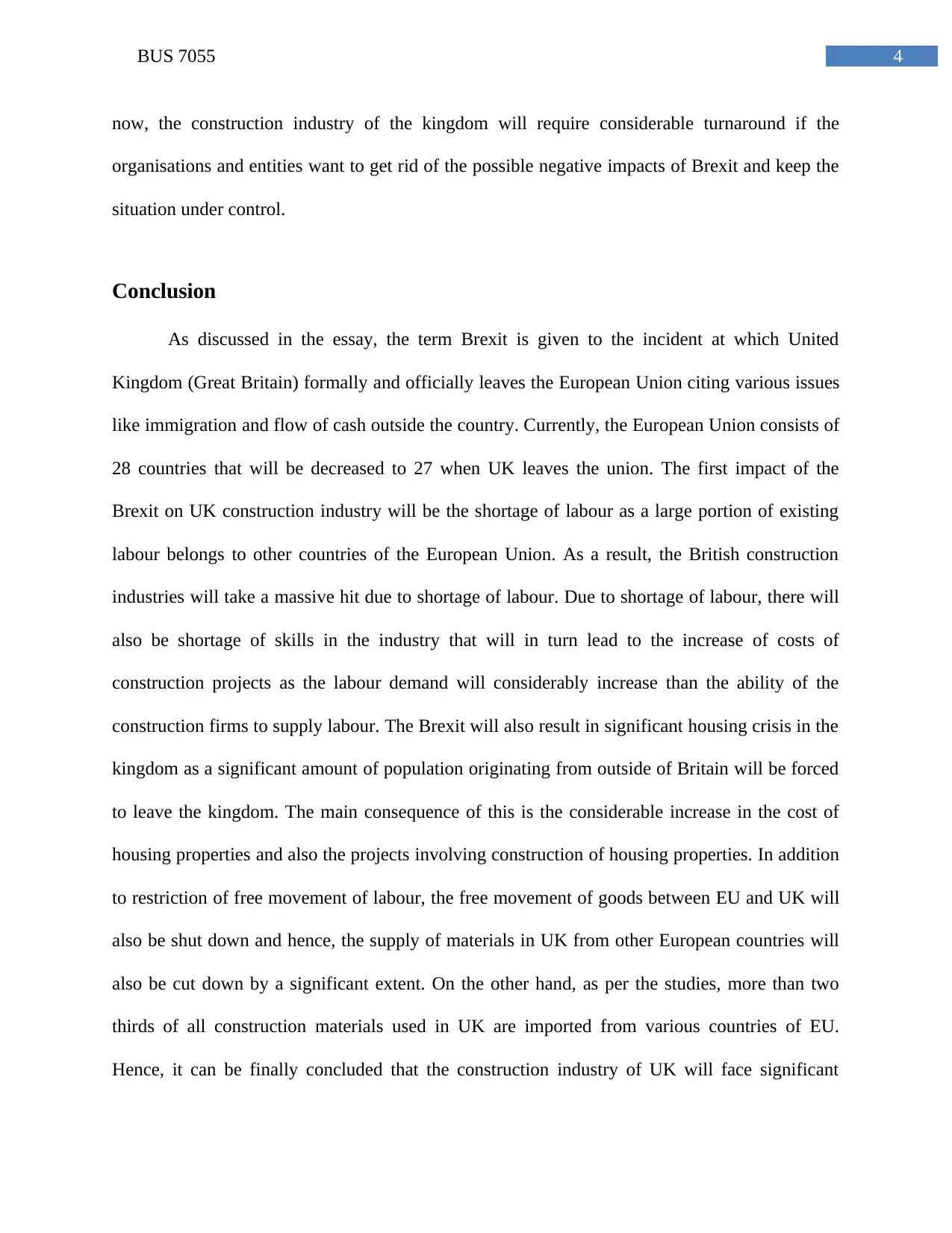
4BUS 7055
now, the construction industry of the kingdom will require considerable turnaround if the
organisations and entities want to get rid of the possible negative impacts of Brexit and keep the
situation under control.
Conclusion
As discussed in the essay, the term Brexit is given to the incident at which United
Kingdom (Great Britain) formally and officially leaves the European Union citing various issues
like immigration and flow of cash outside the country. Currently, the European Union consists of
28 countries that will be decreased to 27 when UK leaves the union. The first impact of the
Brexit on UK construction industry will be the shortage of labour as a large portion of existing
labour belongs to other countries of the European Union. As a result, the British construction
industries will take a massive hit due to shortage of labour. Due to shortage of labour, there will
also be shortage of skills in the industry that will in turn lead to the increase of costs of
construction projects as the labour demand will considerably increase than the ability of the
construction firms to supply labour. The Brexit will also result in significant housing crisis in the
kingdom as a significant amount of population originating from outside of Britain will be forced
to leave the kingdom. The main consequence of this is the considerable increase in the cost of
housing properties and also the projects involving construction of housing properties. In addition
to restriction of free movement of labour, the free movement of goods between EU and UK will
also be shut down and hence, the supply of materials in UK from other European countries will
also be cut down by a significant extent. On the other hand, as per the studies, more than two
thirds of all construction materials used in UK are imported from various countries of EU.
Hence, it can be finally concluded that the construction industry of UK will face significant
now, the construction industry of the kingdom will require considerable turnaround if the
organisations and entities want to get rid of the possible negative impacts of Brexit and keep the
situation under control.
Conclusion
As discussed in the essay, the term Brexit is given to the incident at which United
Kingdom (Great Britain) formally and officially leaves the European Union citing various issues
like immigration and flow of cash outside the country. Currently, the European Union consists of
28 countries that will be decreased to 27 when UK leaves the union. The first impact of the
Brexit on UK construction industry will be the shortage of labour as a large portion of existing
labour belongs to other countries of the European Union. As a result, the British construction
industries will take a massive hit due to shortage of labour. Due to shortage of labour, there will
also be shortage of skills in the industry that will in turn lead to the increase of costs of
construction projects as the labour demand will considerably increase than the ability of the
construction firms to supply labour. The Brexit will also result in significant housing crisis in the
kingdom as a significant amount of population originating from outside of Britain will be forced
to leave the kingdom. The main consequence of this is the considerable increase in the cost of
housing properties and also the projects involving construction of housing properties. In addition
to restriction of free movement of labour, the free movement of goods between EU and UK will
also be shut down and hence, the supply of materials in UK from other European countries will
also be cut down by a significant extent. On the other hand, as per the studies, more than two
thirds of all construction materials used in UK are imported from various countries of EU.
Hence, it can be finally concluded that the construction industry of UK will face significant

5BUS 7055
negative impact from the Brexit and will have to develop alternate plans, policies and standards
in order to recover from the highlighted issues.
negative impact from the Brexit and will have to develop alternate plans, policies and standards
in order to recover from the highlighted issues.
⊘ This is a preview!⊘
Do you want full access?
Subscribe today to unlock all pages.

Trusted by 1+ million students worldwide
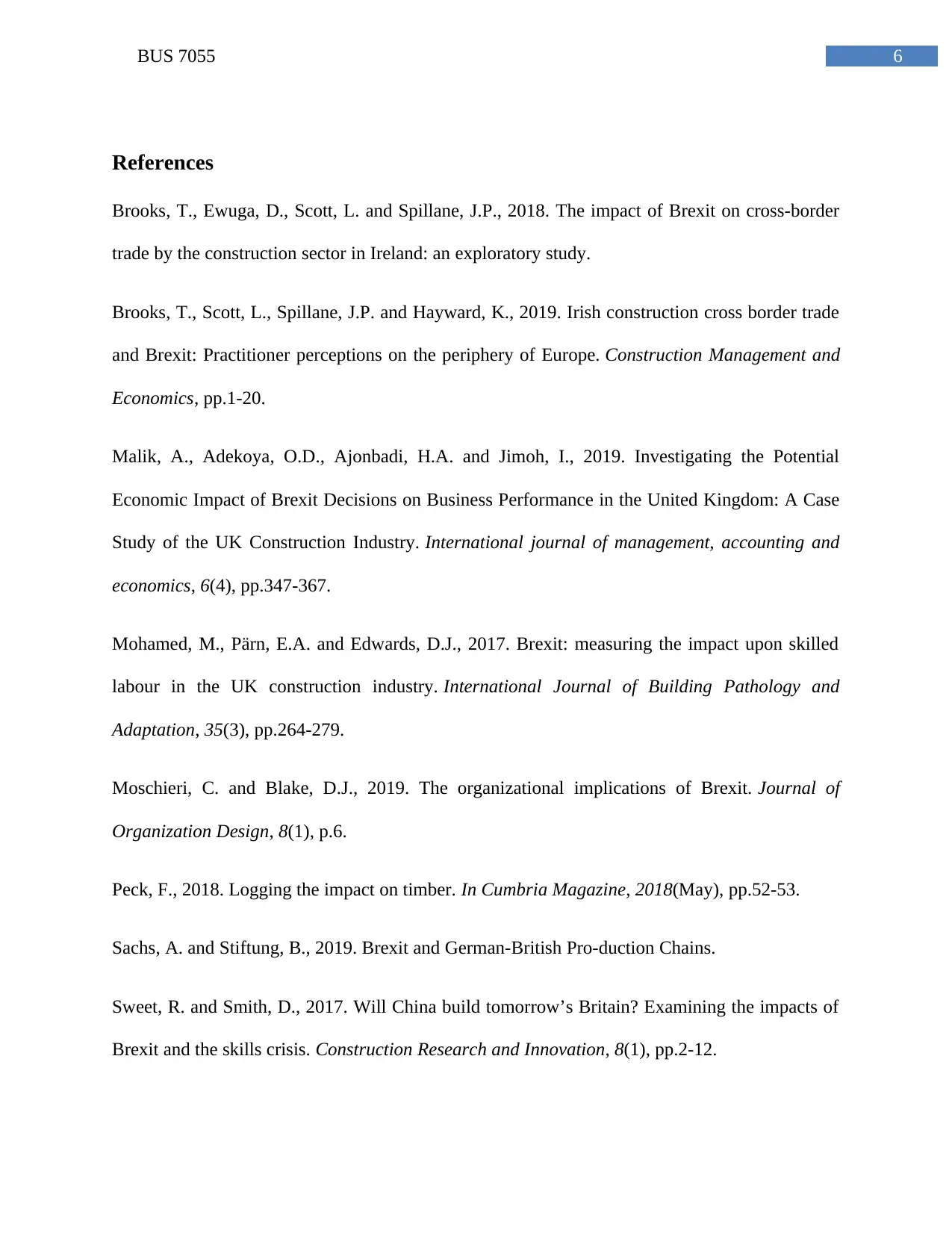
6BUS 7055
References
Brooks, T., Ewuga, D., Scott, L. and Spillane, J.P., 2018. The impact of Brexit on cross-border
trade by the construction sector in Ireland: an exploratory study.
Brooks, T., Scott, L., Spillane, J.P. and Hayward, K., 2019. Irish construction cross border trade
and Brexit: Practitioner perceptions on the periphery of Europe. Construction Management and
Economics, pp.1-20.
Malik, A., Adekoya, O.D., Ajonbadi, H.A. and Jimoh, I., 2019. Investigating the Potential
Economic Impact of Brexit Decisions on Business Performance in the United Kingdom: A Case
Study of the UK Construction Industry. International journal of management, accounting and
economics, 6(4), pp.347-367.
Mohamed, M., Pärn, E.A. and Edwards, D.J., 2017. Brexit: measuring the impact upon skilled
labour in the UK construction industry. International Journal of Building Pathology and
Adaptation, 35(3), pp.264-279.
Moschieri, C. and Blake, D.J., 2019. The organizational implications of Brexit. Journal of
Organization Design, 8(1), p.6.
Peck, F., 2018. Logging the impact on timber. In Cumbria Magazine, 2018(May), pp.52-53.
Sachs, A. and Stiftung, B., 2019. Brexit and German-British Pro-duction Chains.
Sweet, R. and Smith, D., 2017. Will China build tomorrow’s Britain? Examining the impacts of
Brexit and the skills crisis. Construction Research and Innovation, 8(1), pp.2-12.
References
Brooks, T., Ewuga, D., Scott, L. and Spillane, J.P., 2018. The impact of Brexit on cross-border
trade by the construction sector in Ireland: an exploratory study.
Brooks, T., Scott, L., Spillane, J.P. and Hayward, K., 2019. Irish construction cross border trade
and Brexit: Practitioner perceptions on the periphery of Europe. Construction Management and
Economics, pp.1-20.
Malik, A., Adekoya, O.D., Ajonbadi, H.A. and Jimoh, I., 2019. Investigating the Potential
Economic Impact of Brexit Decisions on Business Performance in the United Kingdom: A Case
Study of the UK Construction Industry. International journal of management, accounting and
economics, 6(4), pp.347-367.
Mohamed, M., Pärn, E.A. and Edwards, D.J., 2017. Brexit: measuring the impact upon skilled
labour in the UK construction industry. International Journal of Building Pathology and
Adaptation, 35(3), pp.264-279.
Moschieri, C. and Blake, D.J., 2019. The organizational implications of Brexit. Journal of
Organization Design, 8(1), p.6.
Peck, F., 2018. Logging the impact on timber. In Cumbria Magazine, 2018(May), pp.52-53.
Sachs, A. and Stiftung, B., 2019. Brexit and German-British Pro-duction Chains.
Sweet, R. and Smith, D., 2017. Will China build tomorrow’s Britain? Examining the impacts of
Brexit and the skills crisis. Construction Research and Innovation, 8(1), pp.2-12.
Paraphrase This Document
Need a fresh take? Get an instant paraphrase of this document with our AI Paraphraser
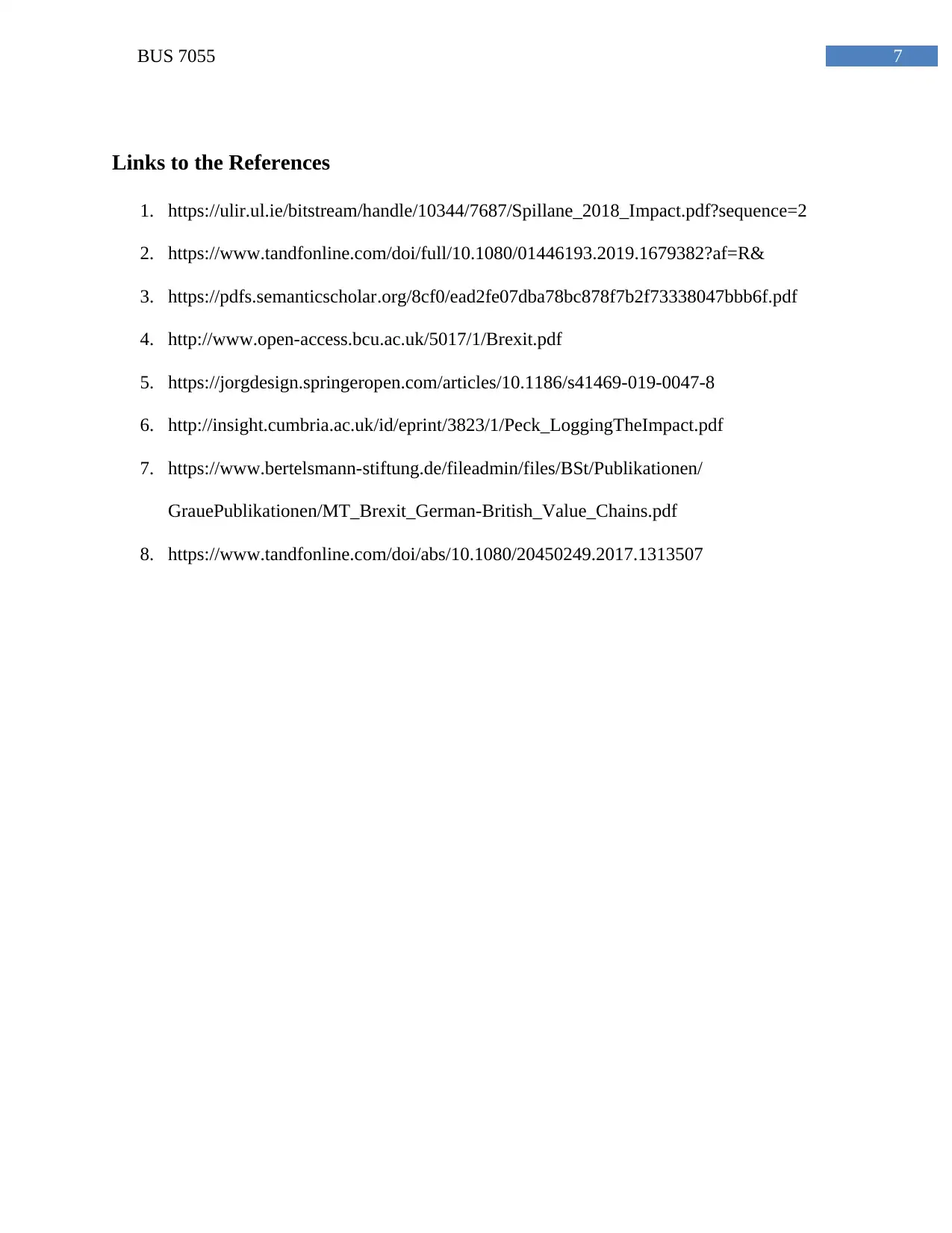
7BUS 7055
Links to the References
1. https://ulir.ul.ie/bitstream/handle/10344/7687/Spillane_2018_Impact.pdf?sequence=2
2. https://www.tandfonline.com/doi/full/10.1080/01446193.2019.1679382?af=R&
3. https://pdfs.semanticscholar.org/8cf0/ead2fe07dba78bc878f7b2f73338047bbb6f.pdf
4. http://www.open-access.bcu.ac.uk/5017/1/Brexit.pdf
5. https://jorgdesign.springeropen.com/articles/10.1186/s41469-019-0047-8
6. http://insight.cumbria.ac.uk/id/eprint/3823/1/Peck_LoggingTheImpact.pdf
7. https://www.bertelsmann-stiftung.de/fileadmin/files/BSt/Publikationen/
GrauePublikationen/MT_Brexit_German-British_Value_Chains.pdf
8. https://www.tandfonline.com/doi/abs/10.1080/20450249.2017.1313507
Links to the References
1. https://ulir.ul.ie/bitstream/handle/10344/7687/Spillane_2018_Impact.pdf?sequence=2
2. https://www.tandfonline.com/doi/full/10.1080/01446193.2019.1679382?af=R&
3. https://pdfs.semanticscholar.org/8cf0/ead2fe07dba78bc878f7b2f73338047bbb6f.pdf
4. http://www.open-access.bcu.ac.uk/5017/1/Brexit.pdf
5. https://jorgdesign.springeropen.com/articles/10.1186/s41469-019-0047-8
6. http://insight.cumbria.ac.uk/id/eprint/3823/1/Peck_LoggingTheImpact.pdf
7. https://www.bertelsmann-stiftung.de/fileadmin/files/BSt/Publikationen/
GrauePublikationen/MT_Brexit_German-British_Value_Chains.pdf
8. https://www.tandfonline.com/doi/abs/10.1080/20450249.2017.1313507
1 out of 8
Related Documents
Your All-in-One AI-Powered Toolkit for Academic Success.
+13062052269
info@desklib.com
Available 24*7 on WhatsApp / Email
![[object Object]](/_next/static/media/star-bottom.7253800d.svg)
Unlock your academic potential
Copyright © 2020–2026 A2Z Services. All Rights Reserved. Developed and managed by ZUCOL.




